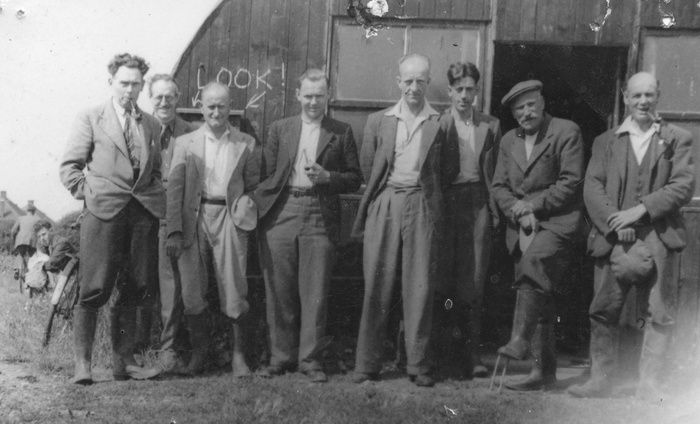Melbourne Park Allotment - a bit of History
04th February 2020
In: Features

An image (we believe in the 50's) of an earlier trading hut with some of the plot holders - including a young Arthur Cornell
The Allotment Association and trading hut in it's current format was established in 2003/4 after a period of dormancy through the late nineties. Arthur Cornell convinced various like minded individuals to get the Association back together, form a committee and re open the trading activities for the benefit of all.
In addition to this, Arthur, Ada and Tony Holbrook had spent some time at the Essex Records Office tracing the history of the Allotments, which we can confirm reach back to 1938. The earliest mention to be found in the Council minutes surround the procurement of land from the land owners (Melbourne Park Estates) for the provision of allotments. Whilst there were some plots laid out at the Highfield Road end of the site, Arthur was one of the first twenty plot holders to take on an allotment on the expanded site in 1947.
Over the winter months we have continued to research the council records in relation to the site, which have heralded various interesting snippets of information, and we will try and recount some of these through future blog posts. The council records seem to dry up around 1969-1970 and we know the independent parks and allotment committee ceased around 1972.
Several of the plot holders who have tended plots at Melbourne since the 80's have kindly agreed to share their thoughts and stories from the site, and we will again with their blessing publish these during the year as a series of feature articles, which will hopefully compliment some of the stories from newer members and our current activities.
As we have quite a number of new members to the Association, we thought it would be a good idea to re publish an article first produced in 2009. Tony Holbrook interviewed Arthur in relation to his time on the plot and these notes can be read by following the attached link. They make very interesting reading.
Interview Arthur Cornell